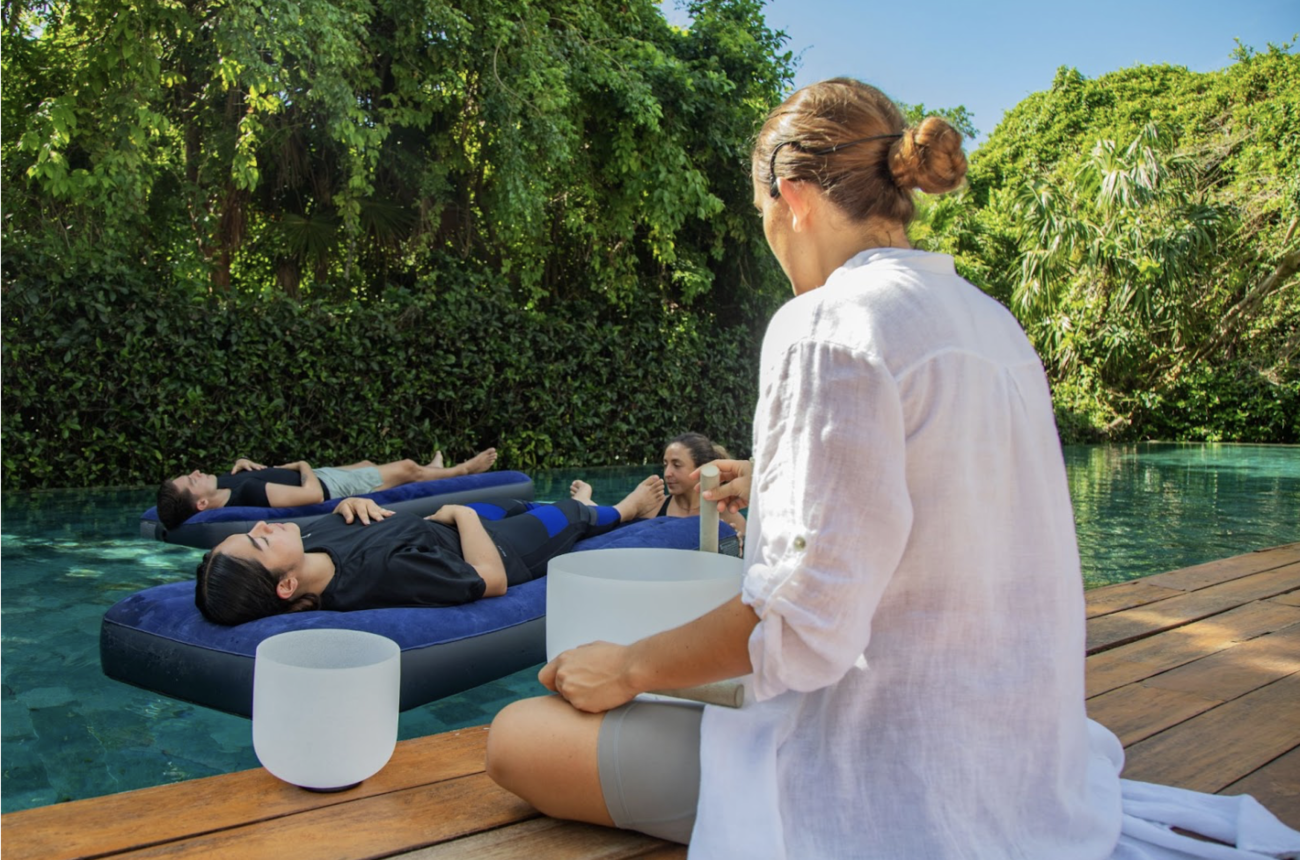The Therapeutic Effect of Water: How Bath Meditation Helps Reprogram the Mind for Greater Concentration

Unlocking Mental Clarity with Water Therapy
Water is often seen as just a basic necessity, but its therapeutic effects are profound and multifaceted. Engaging in bath meditation can offer unique benefits, helping individuals reset their minds and enhance concentration.
In a world filled with distractions, the power of water can help restore focus through various mechanisms. For instance, the simple act of taking a bath can be a transformative experience, promoting both physical and mental well-being. Here’s how:
- Relaxation: Warm water promotes muscular relaxation, easing tension that can hinder mental clarity. The heat from the water helps to dilate blood vessels, reduce blood pressure, and increase circulation, allowing both body and mind to unwind. In Nigeria, after a long day dealing with the hustle and bustle—whether it’s navigating through busy market streets or commuting through traffic—indulging in a warm bath can be a well-deserved escape.
- Mindfulness: Bath meditation encourages a meditative state, allowing for deeper reflection and awareness. By simply focusing on the gentle waves created by the water or the sensation of warmth enveloping the body, individuals can practice mindfulness. This practice has roots in traditional methods used by many indigenous cultures around the world, including those in Nigeria. The Yoruba people, for instance, have long recognized the spiritual significance of water in their rituals and daily routines.
- Sensory Experience: The sound and feel of water can stimulate the senses, anchoring thoughts and aiding focus. The soothing sound of water can drown out distracting noises, making it easier to concentrate on one’s thoughts. This sensory experience can create a peaceful atmosphere that encourages introspection and clarity.
In Nigeria, where daily hustle can be overwhelming, these moments of solitude in water can be transformative. Ancient cultures often recognized water not just as a physical substance but as a source of healing and rejuvenation. Various cultural beliefs around water, such as the idea of ritual cleansing and purification, showcase the deep-rooted appreciation for water’s restorative properties.
Many people have reported significant improvements in their ability to concentrate after incorporating bath meditation into their routine. Research highlights the correlation between tranquil environments and increased cognitive function, suggesting that even a few minutes spent in a bath can clear the mind and enhance productivity. Discovering the therapeutic benefits of water not only promotes mental well-being but can also lead to a more productive life.
So, how can you harness this simple yet powerful element? Consider setting aside time each week for a bath meditation, perhaps enhancing the experience with calming scents from essential oils or soft music. By consciously incorporating this practice into your life, you may find that the restorative power of water not only soothes your body but also invigorates your mind, helping you navigate the challenges of daily life with clarity and ease.

CHECK OUT: Click here to explore more
The Science Behind Water’s Healing Properties
Understanding the therapeutic effects of water involves diving into the physical and psychological benefits it offers. Water therapy, particularly through bath meditation, can be seen as a method to not only relax the body but also to clear and rejuvenate the mind. As people in Nigeria increasingly navigate the stress of modern life, appreciating the profound benefits of water can transform daily routines into opportunities for restoration and mental clarity.
A fundamental aspect of water’s therapeutic capabilities is its ability to influence our body’s chemistry. When immersed in warm water, the heat stimulates the release of endorphins, the body’s natural painkillers and mood elevators. In addition, this immersion triggers a relaxation response that decreases cortisol levels—the hormone associated with stress. By creating a peaceful environment, bath meditation allows individuals to gradually lower their stress levels and foster a sense of calm.
Moreover, water connects us to nature, a component that significantly enhances mental well-being. For those living in bustling urban areas like Lagos or Abuja, where noise and chaos prevail, retreating to a bath can provide the much-needed escape. Nature has always played a vital role in traditional Nigerian practices, emphasizing the importance of reconnecting with our roots. Whether it is through the sound of waves crashing on the shores of Tarkwa Bay or the gentle ripple of a stream in a rural village, nature’s rhythms can enhance one’s meditation experience, fostering mindfulness.
Benefits of Incorporating Bath Meditation
- Enhanced Focus: Regular practice of bath meditation can significantly improve concentration levels. As the mind finds calmness, distractions dissipate, allowing for focused thoughts and heightened productivity.
- Improved Mood: The soothing effects of water can elevate mood and foster a positive outlook. The combination of warmth, buoyancy, and the sensory experience leads to a sense of joy that can permeate throughout one’s day.
- Emotional Release: Bath meditation provides a sacred space to release pent-up emotions. By acknowledging feelings during this tranquil time, individuals can process their thoughts and emerge feeling lighter and more centered.
- Enhanced Creativity: Immersing oneself in water can stimulate the creative part of the brain. Many individuals find that new ideas and inspirations arise during moments of bath meditation, enhancing their problem-solving capacity.
For those seeking to elevate their concentration, the therapeutic effects of water can serve as a guiding light. Integrating bath meditation into a weekly routine—perhaps on a Sunday evening after a hectic week—can establish a refreshing practice that rejuvenates the mind. By embracing these moments of solitude and reflection, individuals will find themselves better equipped to face the demands of daily life, armed with the clarity and focus necessary to succeed.
| Advantages | Description |
|---|---|
| Enhanced Relaxation | Bath meditation promotes deep relaxation, helping to chase away daily stressors and fostering mental clarity. |
| Improved Focus | Engaging in water therapy can reconfigure neural pathways, enhancing one’s ability to concentrate on tasks and improve cognitive performance. |
| Mindfulness Practice | Water has a unique ability to ground individuals, allowing for heightened mindfulness during meditation sessions. |
| Physical Benefits | Bathing in warm water stimulates circulation, aiding in the delivery of nutrients to the brain and supporting overall well-being. |
Exploring the therapeutic effects of water reveals a multitude of benefits that extend beyond mere relaxation. Bath meditation not only cultivates an environment conducive to serenity but also actively reprograms the mind for greater concentration. When engaging in this practice, individuals often find themselves gaining a newfound clarity, allowing them to focus on intricate tasks with remarkable ease.Furthermore, the act of immersing oneself in water serves as a tactile reminder of being present, grounding participants in the moment. This connection to water fosters mindfulness, which is essential for enhancing mental acuity. Research has shown that mindful practices can reduce distractions, making room for improved productivity.In addition to mental benefits, the warmth of water promotes better circulation, which can lead to enhanced nutrient delivery to the brain. Combining these experiences can create a profound impact on mental health and focus, drawing individuals toward the advantages of bath meditation as a long-term practice. The richness of this experience invites readers to delve deeper into understanding how embracing water therapy might just transform their cognitive capabilities.
YOU MAY ALSO LIKE: Read read another article
The Transformative Influence of Water on the Mind
As we delve deeper into the intersection of water therapy and mental rejuvenation, it is essential to recognize how water serves not only as a physical medium but also as a catalyst for mental transformation. Bath meditation transcends mere relaxation, providing a powerful ritual that allows individuals to tap into their inner selves, paving the way for enhanced concentration and cognitive clarity.
One of the lesser-known benefits of bath meditation is its ability to facilitate neuroplasticity, the brain’s inherent capacity to reorganize itself by forming new neural connections throughout life. Studies have shown that engaging in mindfulness practices, such as meditation, can significantly enhance this neuroplasticity. When combined with the enveloping embrace of warm water, bath meditation creates an optimal environment for mental growth. This blend of relaxation and mindfulness encourages learners—from students to professionals—to absorb information more effectively, revolutionizing how they process data and ideas.
Mindfulness and Water: A Dynamic Duo
Mindfulness, the practice of maintaining a moment-by-moment awareness of our thoughts, feelings, and surroundings, can be effortlessly cultivated in the soothing presence of water. Within the context of a bath, the gentle sound of water trickling and the ambient temperature allow for a heightened state of awareness that encourages introspective thought. By concentrating on the sensory elements—the warmth enveloping the skin, the scent of essential oils (like lavender or eucalyptus), and the visual appeal of gentle ripples—individuals can enter into a meditative state that strengthens their focus and calms the mind.
This meditative practice rooted in water has powerful implications. For instance, bath meditation can be especially beneficial for students preparing for exams or professionals facing critical deadlines. A simple, dedicated bath session can create a unique mental space for reprogramming thoughts, turning an otherwise chaotic mind into a highly focused entity primed for success. In Nigeria, amid the hustle of academic and business life, adopting such practices can help individuals perform better under pressure.
Incorporating Traditional Wisdom
Drawing from Nigeria’s rich cultural tapestry, traditional practices often highlight the importance of communal bathing or ritual cleansing in promoting mental wellness and clarity. These practices recognized by various ethnic groups serve to enhance one’s spirit and mental clarity. Integrating these age-old customs with modern bath meditation can yield remarkable outcomes. For example, setting intentions during a bath while surrounded by calming scents and sounds can align one’s energy towards achieving clearer thought patterns.
The social aspect of water, particularly in communal settings, also plays a pivotal role in mental health. Engaging in group meditation or prayer sessions involving water creates shared experiences that promote a sense of belonging and mental support. In regions across Nigeria where collective rituals are prevalent, this dynamic can enrich the understanding of water’s therapeutic effects, further bridging the gap between ancient wisdom and contemporary mindfulness practices.
As awareness about the significance of mental health continues to grow, embracing bath meditation as a consistent practice can empower individuals to reclaim their focus and creativity. When individuals harness the calming and regenerative properties of water, they can embark on a journey of personal growth and clarity, better equipped to navigate the complexities of modern life.
RECOMMENDED: Check out this similar article
Embracing Water as a Path to Mental Clarity
In conclusion, the therapeutic effects of water through the practice of bath meditation reveal a profound connection between physical well-being and mental clarity. This enriching ritual not only serves to relax the body but also becomes an essential tool for reprogramming the mind, enhancing concentration and productivity. The warm embrace of water creates an ideal atmosphere for mindfulness, allowing individuals to tune into their thoughts and feelings while fostering a sense of introspection and focus.
As highlighted throughout this exploration, the benefits of bath meditation extend beyond individual practices, deeply rooted in Nigeria’s cultural traditions that emphasize the significance of water in promoting mental wellness. By integrating these traditional insights with contemporary mindfulness techniques, individuals can experience a harmonious blend that enhances their cognitive abilities, ultimately leading to greater success in both academic and professional realms.
Consider the potential of adopting bath meditation not just as a momentary escape but as a regular practice to enrich your daily life. With the overwhelming pressures faced by many, this mindful approach to harnessing the tranquility of water can offer a restorative refuge, enabling individuals to emerge more centered and prepared to tackle life’s challenges. The journey towards improved mental clarity and concentration begins with a simple act of self-care—embracing the therapeutic power of water.



